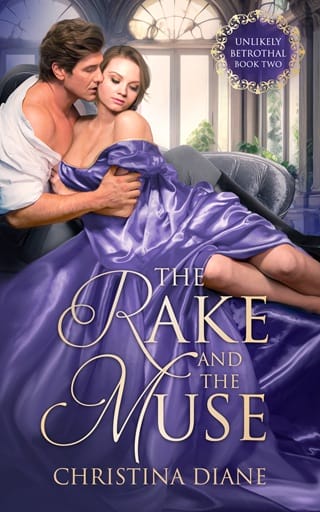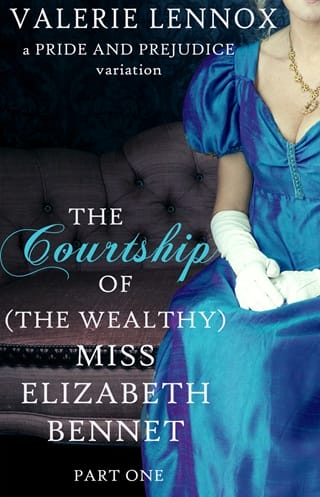Chapter X
T he relief Bennet felt when he caught sight of Longbourn again filled his breast, and for the first time, even given his arrival the previous month, he felt like he was returning home. It was strange, he mused, for the parsonage that had been his home for much of his life had never prompted such profound feelings as the sight of Longbourn did at that very moment. Perhaps there was something about a man's connection to a location that had been in his family's possession for generations, even if deceitful men had interrupted their residence there.
? As the carriage drew to a halt, Bennet looked out at the scene, noting the improvements made to the property in only a week. The drive was now clean and orderly without the choking weeds, the ivy on the walls trimmed and tidy, and much of the detritus of the accumulation of years without a hand to tend the grounds cleared away. It was beginning to appear like the home he had always imagined Longbourn should be. Pride filled Bennet's breast, pride in his home, the legacy of the Bennets that had gone before. In the end, only a single Bennet master had not had the privilege of owning the estate, and while he mourned what had happened to his father, he was grateful for being reinstated to his home, regardless of how it had come about.
? Bennet descended from the coach when it had shuddered to a stop, accepting the laughing greetings of his beautiful daughters. Elizabeth, the most effervescent, jested about the time he had stayed away, while Mary and Jane, more naturally quiet than their sister, welcomed him, pleased to be reunited again. Bennet drew them all in close, his heart bursting with love and the pride of a father, for never had any man called such excellent women his progeny.
? "It appears you have all been busy in my absence," said Bennet, pulling back, his gaze roving over them all. "I can scarcely wait to see your changes in the sitting-room, and I suspect some of what I see in the grounds has come of your handiwork too."
? "Wait until you see Jane's rose garden, Papa," piped up Mary. "It is larger than the garden at the parsonage, and I dare say it will be far more beautiful when guided by my sister's expert hand!"
? "I love to tend to it," said Jane in her modest way.
? "Well do I know it, Jane," said Bennet, touching his daughter's cheek with affection. "The most shocking development is your capture of the steward when he was up to no good. I might not have imagined such an ability for intrepid sleuthing as you displayed."
? "It was John who caught him, Papa," said Elizabeth, pointing to the footman, who was even now seeing to his effects. "John found him searching your desk, and Theodore ensured that Mr. Sykes could not escape until the constable came to retrieve him."
? "I did nothing more than my duty," said John, though he did not stop what he was doing. "It was well that you warned me about him."
? "By your diligence," said Mr. Bennet with a nod for the longtime servant, "you have again proven your loyalty. I thank you, John, for you have done more than anyone could expect. You may inform Theodore that you will both receive a reward for your quick-thinking actions."
? John paused long enough to bow, then he turned his attention back to the trunks already unloaded and waiting on the drive. In short order, John and Theodore gathered the items and carried them into the house, leaving Bennet to his reunion with his daughters.
? "You will all wish to learn what I discovered in London I warrant. If you will allow me some moments to refresh myself, I shall join you in my study."
? The girls chorused their agreement, allowing Bennet to enter the house and return to his room. Bennet spent little time there, for he was no fastidious man, and soon he joined them in the study, appreciating the tray of tea and cakes they had requested for his sustenance. With another hearty greeting for them, Bennet drew his chair from behind his desk and situated himself near them, so they might speak of what he had discovered.
? "As you know," said Bennet, "I have had little success in making any sense of the ledgers of the estate, such that I had no notion of our financial position. There were enough ready funds in the desk when we arrived to see to our immediate needs and engage the laborers to refresh the sitting-room, but beyond that, I could not say if there was anything in the accounts."
? Jane frowned. "Did you think there would be nothing? The estate is more prosperous than that."
? "I cannot but agree with you about that last," said Bennet. "Before his passing, however, Mr. Collins could have done whatever he wished with the proceeds of the estate. He could have disbursed the profits among his relations, for example, and no one could gainsay him."
? "You did not expect that," said Elizabeth. "Else, why would he even leave the estate to you?"
? Bennet shook his head. "I still cannot explain the reason for my inheritance of the property, Lizzy. It seems unlikely he would drain the estate's coffers and leave the property to me rather than willing it to a relation, yet I had some notion that he might have done just that, a final insult to the Bennet family to leave us near insolvent."
? "That was not what you found," observed Elizabeth.
? "Perceptive, as always, my dear," replied Bennet. "You are correct. As the ledgers did not yield the information I required, I had thought to approach the banker, but as you know, he sent me a letter requesting my presence for an urgent meeting before I contacted him. That was what drew me to town, though I also visited Darcy while I was there."
? Bennet laughed at the interest shown by his daughters. "First, let us discuss what happened at the bank, for it is the more important by far."
? When they subsided, Bennet explained what he had found at the bank, the surprising balance of the estate accounts, and the discussions he had with the banker. The account left his daughters astonished.
? "How did Mr. Collins amass such a fortune?" demanded Elizabeth, speaking for her sisters.
? "It seems he had been prudent from the time he had taken control of Longbourn." Bennet shrugged. "While I long considered him to be the worst of men, he was not a poor master of the estate."
? "Then the money had many years to grow," said Elizabeth, delighting Bennet with her quick understanding. "And Mr. Collins's additions over the years increased it substantially."
? "That it did," said Bennet. "The final piece of the puzzle was the information you included in your express. With the name of the bank and the account number, Mr. Pritchard recovered the money the steward had stolen from the estate. It seems he has worked at Longbourn for more than a decade, for he opened the account—a different account from the one he had already owned before—and had taken a certain amount from the rents as early as twelve years ago. He gradually increased the amount he was stealing as he became certain Mr. Collins was in no condition to catch him in the act."
? "What an odious man!" exclaimed Elizabeth, while Mary chimed in with: "Thou shalt not steal. Mr. Sykes never read the Bible."
? Bennet nodded to his daughters. "It appears he did not."
? "It is all so strange," said Jane. "Mr. Sykes must have known that the risk of discovery was great. Why did he not resign his position when Mr. Collins died? He might be halfway to the New World before we learned anything of this."
? "Why did he risk invading your study?" added Elizabeth.
? "Those are questions I shall ask him when I visit the jail," said Bennet. "While I cannot see into his thoughts, I suspect greed was his undoing. It is also possible he was overconfident, given his success these past dozen years."
? Elizabeth nodded while Mary shook her head with distaste. Jane, as was her wont, betrayed little reaction, though her disapproval was clear to any who knew her.
? "Regardless of what he was thinking," continued Bennet, "his schemes have come to naught, and we regained the money he appropriated. The question now is what to do with what we recovered."
? "What do you mean, Papa?" asked Elizabeth, fixing him with no little interest.
? "Just that when considering the amount in the estate's accounts with the money we recovered, the total is something over sixty thousand pounds."
? The three girls gasped as one. Much like Bennet himself, the girls had been brought up to get by with little, for though the parish had provided an excellent living for a parson, it could not compare with even the humblest estate. Sixty thousand pounds was a veritable fortune, no matter how one looked at it.
? "That is astonishing, Papa," said Elizabeth. "Even when you informed us that the amount was great, I could not have imagined even half such a sum."
? "To own the truth," said Bennet, "nor could I. The question now becomes, what shall we do with our sudden prosperity?"
? None of the girls responded at once, and Bennet suspected it was from an inability to conceive of what could be done with such a sum. There were many ways in which that money could be put to use, and through his conversations with Gardiner and Mr. Pritchard, Bennet thought the decisions he made had the potential to pay handsomely in the future. Yet he was curious to know what his daughters might suggest.
? "Would it be possible to add to the estate?" asked Elizabeth after a few moments.
? "Very good, Lizzy," said Bennet. "Even sixty thousand pounds is not sufficient to add enough land to the property to make it the equal of Chatsworth, or even Netherfield, I suspect. While there is a possibility of purchasing Netherfield and adding it to Longbourn, I do not believe Netherfield is for sale, and I would not approach Philips to ask after it regardless. There may be an avenue to learn something of Netherfield's situation, but that will come later.
? "However, there are better ways to make use of the capital we now have at our disposal."
? When the girls clamored to know what he meant, Bennet held up his hands, asking for their patience. "I will not withhold these matters from you, so I ask your indulgence. The first matter to consider is the situations of my excellent daughters, for while they were the daughters of a parson, now they are gentlewomen."
? Elizabeth gasped, the first to understand his reference. "You added to our dowries?"
? "I have," confirmed Bennet. "As you know, my father was a frugal man and saved much of his income, and as I was his only child and then later in life, he had many years to save. Since I became the master of the parsonage, I increased your dowries as I could, though they were still small. Now that you are the daughters of a gentleman, your dowries should reflect your change in status."
? "But Papa!" protested Elizabeth. "Does the estate not need it more?"
? "The estate needs it more than my precious girls?" asked Bennet rhetorically. "Perish the thought, Lizzy!"
? The ladies did not quite know what to make of that, and Bennet chuckled at his ability to flummox them. "No, you are not each to have twenty-thousand-pound dowries, my dears. Though I might wish to give you everything, I am a more prudent man than that. With the money I already had saved for you, invested by your uncle Gardiner, I added enough funds to settle a dowry on each of you of seven thousand pounds."
? At the girls' shock, Bennet added: "To own the truth, I was inclined to make it ten thousand pounds, but Gardiner argued me from it. Seven thousand, he insisted, was a handsome sum for the daughters of a country squire. As he has invested those funds, they will continue to grow, though should you marry soon, they will have little time to increase."
? "Even seven thousand pounds seems like a veritable fortune," said Mary.
? "To ladies of your current situation," said Bennet, "I believe they are. While I cannot say for certain, I doubt there are more than a handful of ladies in this district who have more, if there are any at all. Other than Longbourn, Netherfield is the only estate larger. Then again, when compared to Miss Darcy's fortune, which I understand is thirty-thousand pounds, seven thousand is a paltry sum, is it not?"
? "Only if one does not consider our portions before," said Elizabeth. She searched Bennet's eyes, saying: "Are you certain, Papa? I would not wish to take such a fortune if you can better use that money elsewhere."
? "I have never been so certain of anything," replied Bennet. "It is my wish that you have these fortunes, Lizzy, for I wish you to have the best possible chance of attracting husbands."
? While it was clear his daughters were still uncertain, they nodded their agreement.
? "Even with that reduction, there is still more than forty thousand pounds to work with. I discussed the matter with your uncle, and he believes that by investing the money in projects of his choosing, ventures of which he has knowledge and money of his own invested, we can lay the foundation for the future security of the estate. There is even some money set aside to refresh this house, and some money to keep ready in the eventuality I can add to the estate. Should the opportunity arise in the future to purchase an additional property, there will be more than enough for an initial payment, and perhaps even enough to purchase a property outright. This will, of course, depend on the size of the property and the extent to which the original amount has grown."
? "I could never have dreamed of this, Papa," said Elizabeth.
? "You are not the only one," laughed Bennet. "I was as shocked as you. Yet I think with your uncle's help, we have done the best we could with the resources at our disposal. Only time will tell to what extent it will come to fruition."
? They chattered away for some time, the shock of the situation giving way to the novelty of their new fortunes and the sudden ability to redecorate to their heart's content. After a time of this, they turned to the other matter Bennet had referenced early in their conversation.
? "Yes, I visited Darcy and spoke with him. Darcy had some ideas of what to do with the money that your uncle thought worthy of pursuing. Of more immediate interest, I persuaded Darcy to come to Longbourn at once."
? When the girls' voices rose, demanding he explain himself, Bennet added: "I do not know why he had thought to delay his coming. He spoke of a disappointment Miss Darcy had suffered, but he did not elaborate, and I did not ask him to explain."
? "Of course, you did not," said Elizabeth. "Then Miss Darcy's spirits are low?"
? "It appears she could use a friend." Bennet grinned at his three daughters. "Or three friends, I dare say. I informed Darcy that if anyone could pull his sister from her melancholy, it was my daughters. Do you suppose I was overestimating your abilities?"
? "How dare you suggest such a thing!" declared Elizabeth, her eyes twinkling with mirth. "Between us, I dare say we shall turn Miss Darcy into a happy, laughing creature within a fortnight!"
? "I told Darcy a week," observed Bennet. "I hope you will not make me into a liar."
? The girls exchanged glances and nodded as one. "Our father has thrown down the gauntlet," said Elizabeth. "I say we have no choice but to prove our worth."
? "Aye, Lizzy," exclaimed Mary, her shoulders shaking with laughter. "We must start the moment she alights from the carriage, for her melancholy may be deeper than we fear."
? "We shall, of course, assist her in any way we can," added Jane, nodding to their father. "My sisters jest, but we shall anticipate making her acquaintance. No one can resist all three of us when we join together."
? "Excellent, my dears. Darcy is handling some last-minute business in London, but I believe we can expect him to join us with his sister within three days."
? When the ladies departed from his study fifteen minutes later, they were engaged in discussing what activities they might devise for Miss Darcy's amusement, and how they might combat her sadness. The poor girl would not stand a chance, for they were an irresistible force when they banded together.
? With an amused shake of his head, Bennet turned back to his desk. With a last glance through the old ledger, he put it back on the shelf before turning to a new tome he had purchased in London to replace it. The matter of the Collinses' stewardship over Longbourn could now be relegated to the past. Bennet preferred to look toward the future.
"Could you ever have imagined such wealth as we are to possess?" asked Elizabeth of her sisters.
? The evening had grown late, such that their father had already retired for the night, citing his travels that day as the reason for his fatigue. The three sisters would follow him before long, though they had lingered in the sitting-room, each involved in their chosen pursuits.
? "I hope, Lizzy," said Mary, her mirthful tone crowding out any suggestion of censure, "that you will not succumb to pride because of your sudden prosperity. Jane, we may need to take a hand to curb our sister's conceit."
? "Perhaps we should attend to it at once," said Jane. "We would not wish Miss Darcy to see Lizzy as a supercilious and haughty woman."
? "Oh, I dare say she could teach us a few things about such subjects." Elizabeth grinned and added: "After all, her dowry is more than we possess together!"
? Her sisters laughed at Elizabeth's jest, though Mary shook a finger at her. "How we carry on! By all accounts, Miss Darcy is as humble a creature as we will ever meet!"
? "I do hope so," said Elizabeth. "Yet I stand by my words. To have even such a fortune as seven thousand pounds would have been unthinkable only a month ago."
? "It is still difficult to fathom even now," said Jane, her voice quiet and introspective.
? "I hope you will forgive me," said Mary, "but I would hope that my future husband would take me without even a farthing to my name so great is his love for me."
? Elizabeth shared a glance with Jane and burst out laughing. "You say this, yet you are accounted the practical sister, while we are the romantics!"
? "Laugh if you will, Lizzy," said Mary, more than a trifle primly. "Yet I shall not recant. "I never disputed the desirability of a partner who worships the ground on which I walk. Perhaps I look more toward the practical side of marriage, but I have never been blind to romance."
? "In fact," said Elizabeth warmly, "neither Jane nor I would ever wish you to recant, Mary, for we both agree without reservation."
? "We do," affirmed Jane.
? "There can be no greater blessing than a meeting of minds and hearts with our husbands. The trick, I think, is to ensure we choose correctly, for it is not difficult to confuse love with infatuation."
? "In this you have experience?" teased Mary.
? "No, but I believe it all the same."
? "As do I," said Jane.
? Mary nodded, though she appeared distracted. "Do you suppose having a dowry will make it more difficult to find such a man? Will the promise of our increased wealth not sway even the best of men?"
? "There is a simple solution to that dilemma, Mary," said Elizabeth, restraining her humor to appear serious. "We must only find gentlemen who possess fabulous wealth, for whom seven thousand pounds is a mere trifle. Then we know that he is marrying us for inclination, for our dowries will mean nothing to him."
? "Oh, Lizzy!" exclaimed Jane and Mary in tandem.
? "And," continued Elizabeth, "I believe we shall have a chance to do just that soon, for according to Papa, Mr. Darcy is a wealthy man, indeed!"
? "Do you mean to put yourself forward as a potential mate?" asked Jane.
? "Perhaps I do," replied Elizabeth. "Do you mean to take my chosen conquest from me and bedazzle him with your beauty and sweet temper?"
? Jane shook her head, grinning all the while. "Would it teach you a lesson if I did? Would you then stop this incessant teasing?"
? "I cannot imagine anything would prevent me from making sport with you, dear Jane," said Elizabeth. "But if you were to steal Mr. Darcy from me, I might learn to hate you forever."
? "We always knew the only thing that could come between us was a man," quipped Mary.
? "Then, by all means, we must avoid that at any cost," said Jane with a sage nod. "I would not have Lizzy's enmity for the rest of my life, for that would not do at all."
? "I can be a most vindictive enemy," supplied Elizabeth.
? "This is a silly conversation, indeed!" cried Mary. "Are we children of five to be speaking in such a fashion?"
? "Not at all, Mary." Elizabeth winked. "Perhaps eight, but certainly not five!"
? "The fact is," said Jane, "that our dowries might attract attention we might not otherwise receive. It may also provoke good men to pay us attention."
? "Financial considerations are of importance," said Elizabeth sagely. "I would not marry a man who cannot support me, no matter how much I loved him."
? "That is true," agreed Mary, Jane nodding along with her.
? "How much do you remember Mr. Darcy?" asked Elizabeth of Jane.
? "I was fifteen, Lizzy," said Jane. "I remember Mr. Darcy well.
? "Will you not say something more?" asked Mary. "I was but twelve at the time and paid little attention to Mr. Darcy, for he did not interest me."
? "What of you, Lizzy?" asked Jane, ignoring Mary's question for the moment. "You were already thirteen at the time; do you not remember Mr. Darcy yourself?"
? "I remember him," said Elizabeth, considering the young man he had been. "Yet, I believe immaturity colors my memories. He seemed impossibly tall and handsome, but I cannot make out whether those are the memories of an adolescent girl or an accurate representation of the man."
? Jane fixed Elizabeth with a soft smile. "If you will recall, I was naught but an adolescent. Yet I can say that Mr. Darcy was a handsome gentleman, though I cannot speak to whether his height breaches the rules of what is possible!"
? All three sisters laughed at Jane's jest.
? "Then I suppose we must wait to make the man's acquaintance," said Elizabeth. "Given our father's esteem, I cannot imagine Mr. Darcy is anything but an excellent man." Elizabeth grinned and winked at her sisters. "Whether he will do for one of you, however, I shall reserve judgment."
? "Perhaps he will do for you, Lizzy," suggested Mary.
? "Ah, but I am most discriminating, which is why I shall never marry, and instead content myself with being a maiden aunt to your children."
? "And yet," said Jane, "I do not think you are any more discriminating than Mary or myself."
? "Perhaps you are correct."
? The sisters fell silent thereafter, each caught up in her own thoughts. On the morrow, they would make use of the extra funds their father had set aside for their use in changing Longbourn's dated fashions, and soon after, they would welcome their visitors. While Elizabeth looked forward to the prospect of altering her room to reflect her tastes, the greater part of her interest she reserved for their coming guests. Had she any notion that they would prove themselves demanding and above their company, her heart might have held a measure of foreboding. As it was, she could feel nothing but anticipation.
 Fullepub
Fullepub 



